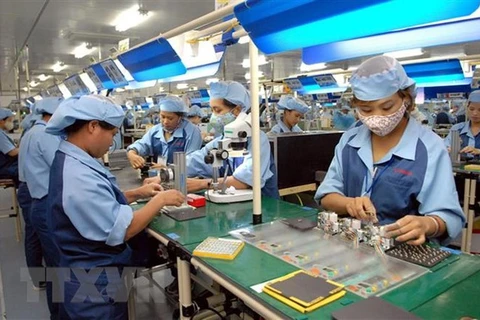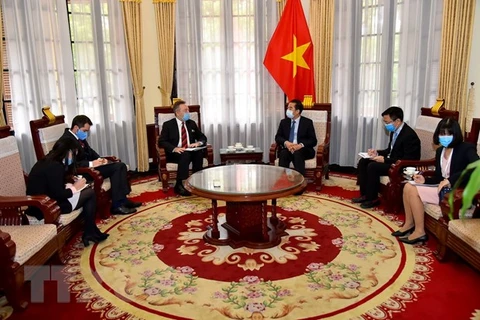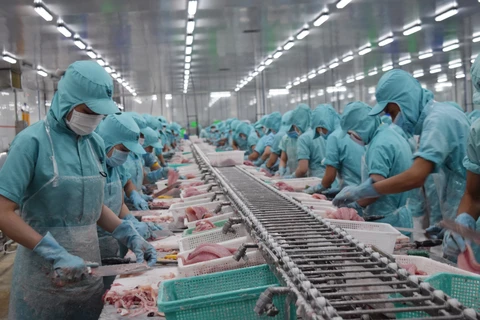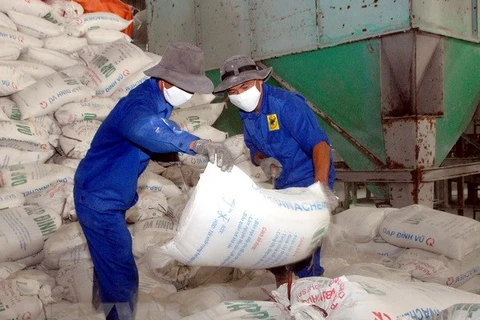 Many key products such as textile, footwear and farm produce will have opportunities to boost exports to the EU when EVFTA takes effect. (Photo: VietnamPlus)
Many key products such as textile, footwear and farm produce will have opportunities to boost exports to the EU when EVFTA takes effect. (Photo: VietnamPlus)
Hanoi (VNA) - Under EVFTA commitments, as soon as the agreement comes into effect, the EU will eliminate about 85.6 percent of tariff lines on Vietnamese goods, equivalent to 70.3 percent of Vietnam's revenue from exports to the bloc.
The strong market-opening commitment in the Vietnam-EU Free Trade Agreement (EVFTA) will certainly promote trade relations between the two sides.
According to experts, key products such as textile, footwear and agricultural products of Vietnam will have many opportunities to expand the market and enhance export value when the EVFTA is enforced.
Many tariff preferences
Europe is one of the most important trading partners of Vietnam, with import-export turnover in 2019 hitting 56.39 billion USD, including 41.48 billion USD worth of exports and 14.91 billion USD worth of imports.
Under EVFTA commitments, as soon as the agreement comes into effect, the EU will eliminate about 85.6 percent of tariff lines on Vietnamese goods, equivalent to 70.3 percent of Vietnam's exports to the bloc. Within seven years since the deal enters into force, the EU will remove 99.2 percent of tariffs, or 99.7 percent of Vietnam’s exports.
For the remaining 0.3 percent of Vietnam’s exports, including some rice products, sweet corn, garlic, mushroom, sugar and other products with high sugar content, the EU pledged to provide Vietnam with tariff-rate quota, with the import tax rate set at zero percent within the quota.
Right on the first working day of the 9th Session of the 14th National Assembly (May 20), Minister of Industry and Trade Tran Tuan Anh said that the Government has basically completed all related works, from law amendments for compliance with the EVFTA to preparation for the implementation of the agreement.
Especially, when the deal comes into effect, Vietnamese businesses will have opportunities to access new supply chains replacing traditional ones that have been disrupted or stalled due to the COVID-19 pandemic. This is an important premise for businesses to recover and promote production and business after the pandemic as well as expand and diversify export markets, reduce dependence on a group of certain markets.
In addition to the positive and clear economic impacts, and legislative reforms towards international standards, the EVFTA is expected to help Vietnam speed up poverty reduction.
Minister Tran Tuan Anh said the highest priority task right after the agreement is ratified and takes effect is to disseminate legal knowledge and provide timely and complete information on the agreement as well as the Government's action programmes.
According to Nguyen Thu Trang, Director of the WTO and Integration Centre under the Vietnam Chamber of Commerce and Industry (VCCI), the agreement will be a "push" for businesses to boost exports again.
However, she also noted that businesses need to closely monitor the situation to have appropriate production and business plans while promoting online trade and business connection to maintain and develop the market, even when the COVID-19 is developing complicatedly in some countries.
Thoroughly grasping regulations for success
The EU is a high-income market, and it also has a strict consumer protection policy with technical barriers to imported products. Therefore, the EVFTA features strict requirements for ensuring rules of origin and compliance with regulations on intellectual property, labour and the environment.
Tran Thanh Hai, Deputy Director of the Import-Export Department under the Ministry of Industry and Trade, said that when the agreement comes into effect, Vietnamese enterprises will have more advantages in accessing markets when almost all commodities exported to this region will enjoy a tax rate of zero percent following a roadmap of 7-10 years.
But according to him, the important issue is that businesses need to identify and find solutions to overcome barriers, especially those related to quality standards.
Meanwhile, economic expert Nguyen Dinh Cung, former Director of the Central Institute for Economic Management, held that the most obvious and immediately visible opportunities are those to export farm produce as soon as the EVFTA takes effect. As Vietnam's strength, the sector is facing difficulties in some markets due to the impact of the COVID-19 pandemic.
“In the current context, demand for agricultural products and food continues to increase and Vietnam is controlling the disease very well, so this is also an opportunity for businesses to promote and expand production as well as invest more in agriculture and market restructuring, product restructuring and restructuring of agricultural production organisation,” Cung said.
Along with strengthening the overall relationship with the EU, the EVFTA will also create very good conditions for Vietnam and each EU member state to open up cooperation opportunities on the occasion of promoting each country's comparative advantages, helping develop bilateral cooperation in a more substantive and sustainable manner.
Through the EVFTA, Vietnam has the opportunity to welcome the wave of investment from the EU markets, which boast high technology and governance./.
























